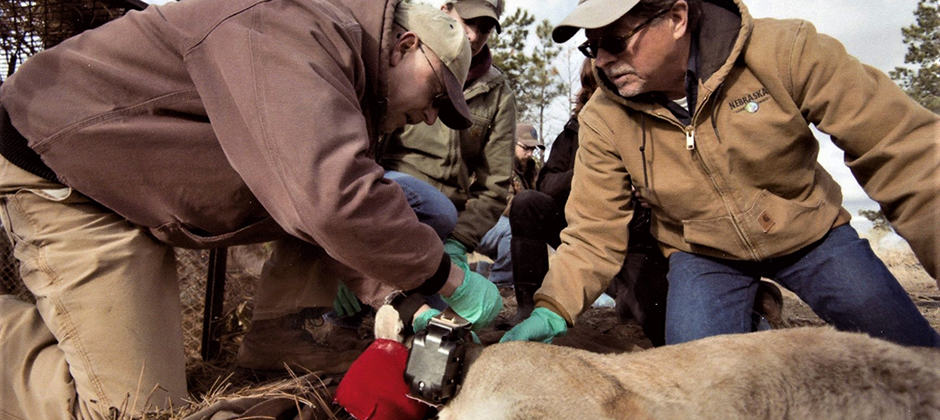Share this article
Greg Schenbeck recognized for his service with TWS
Greg Schenbeck, has worked with a number of state and federal agencies throughout his career, and he has continued striving to benefit wildlife through his work at The Wildlife Society even after retirement.
His service to the Society and wildlife in general has earned Schenbeck the TWS 2021 Distinguished Service Award.
“I don’t feel like I retired at all,” said Schenbeck, who has been a member of TWS for nearly 50 years. “Retirement opened the doors, so I have more time to work with TWS on wildlife conservation issues and opportunities.”
Schenbeck became a member of TWS in 1972 as a junior at Colorado State University. In 1979, he became a Certified Wildlife Biologist and is a life member of the South Dakota and Nebraska chapters of The Wildlife Society. He also belongs to the Central Mountains and Plains Section and is active in the Rangeland Wildlife Working Group.
Schenbeck has authored and co-authored numerous publications over his career. He and his colleagues recently published a paper in the Wildlife Society Bulletin on research looking at sharp-tailed grouse (Tympanuchus phasianellus) nesting in the Nebraska Sandhills. “This was the culmination of a lot of work over a long time, and we’re pleased to finally have it published,” he said.
Schenbeck has been active in TWS at the chapter, state and national levels. “Because TWS can make impactful and important differences in wildlife management where employees are unable to contribute, Greg tirelessly engaged TWS and continues to engage it at many levels,” wrote Central Mountains and Plains Section President Shelly Deisch, in a nomination letter.
“He knows how to be the voice for wildlife, other TWS members, and natural resource federal and state agencies,” Deisch wrote.
Schenbeck recalls helping organize a symposium on managing biodiversity on native rangelands for a joint Central Mountains and Plains Section and Nebraska Chapter annual meeting in 1995. The proceedings were later published as a U.S. Forest Service technical report. “Working on the symposium was really enjoyable for me because managing native rangelands and grasslands as wildlife habitat has been and remains my primary professional interest,” he said.
Schenbeck also served on a committee to develop a proposal for a new wildlife management curriculum in the Rangeland Management Department at Chadron State College in Nebraska. The curriculum was approved and put in the classroom in 2004, and Schenbeck had the opportunity to instruct the first class in the new curriculum as an adjunct faculty member. The college now has a chartered TWS student chapter. Later, as a biologist with the Nebraska Game and Parks Commission, he was able to hire some of the graduates from the new program. “That was a very rewarding experience for me, to be able to work with these young folks full circle from the classroom to the field,” he said. He was also a team instructor for several years at the Nebraska Range Short-Course held at Chadron State College and at the annual South Dakota Youth Range Camp.
Deisch counts herself as one of the wildlifers Schenbeck has influenced. He mentored her “at a time when few women were encouraged or dared to venture into a wildlife career,” she wrote. “Greg taught me the value of continuing my association with TWS beyond a student chapter. Without his influence, I would not be as involved in or recognize the stronghold TWS has had with my career.”
Schenbeck said that one of his career highlights was working on eight national grasslands in the Dakotas, Nebraska and Wyoming. “Where else could you work with such a diversity of wildlife and wildlife habitats, from prairie dogs and black-footed ferrets, sagebrush and sage-grouse, to diverse grasslands and prairie-chicken?” he said. As a former member of the National Black-footed Ferret Recovery Team and state-level recovery teams in both South Dakota and Wyoming, he said, it has been rewarding to see black-footed ferrets on the ground again at several reintroduction sites on both public and private lands.
He continues to be around when TWS needs him, including reviewing federal proposals and drafting comment responses for the Rangeland Wildlife Working Group. He also recently represented the South Dakota TWS Chapter reviewing and commenting on the revision of the South Dakota Greater Sage-Grouse Management Plan. “If I’m familiar with and have some experience in a particular subject area, if I can add something, I’ll assist where I can,” he said.
Most of his career has “basically been in the trenches,” Schenbeck said, and TWS was his professional support all along the way. “It was where I went to stay grounded in science and not become overly distracted by the politics associated with federal land and resource management,” he said. “Being honored by the organization and its members reminds me of how fortunate I’ve been to work side by side with so many dedicated TWS wildlife professionals and others over the years.”
Click here for a complete list of 2021 TWS award winners. For more about this year’s virtual conference, click here.
Header Image:
Greg Schenbeck, right, and his supervisor Todd Nordeen, place a GPS collar on a young mountain lion for the Nebraska Game and Parks Commission.
Credit: Nebraska Land Magazine/Nebraska Game and Parks Commission








